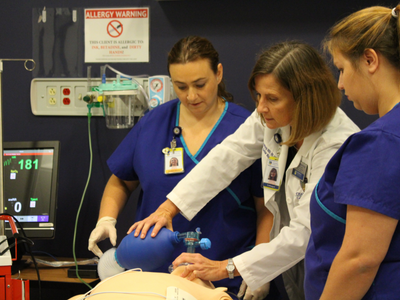Featured
Tags
Share
- Home / Blog / Tips for Students / My Nursing Specialty: Healthcare Simulation Educator
My Nursing Specialty: Healthcare Simulation Educator

Lacey Harris had been working in an emergency room as a licensed practical nurse for 10 years when she decided to make a change and go back to school.
Working while attending nursing school was something Harris knew would take discipline and time management skills in order to do right. But with the support of her friends, family, and boyfriend she has been able to juggle working in the ER with her studies.
Harris, a 3-Year Bachelor of Science in Nursing student on Chamberlain College of Nursing’s Indianapolis campus, recently shared some tips on how she makes it all work:
1. Create a Schedule that Works for your Lifestyle
Use every moment possible to sneak in an extra study session, Harris advises.
“I take my book bag everywhere I go just in case I get time to study,” she said. “Sometimes I can study at work. We get 30 minutes for lunch so I try to study and keep up on my reading during that time.”
Another tip Harris recommends? Getting a head start on assignments before the due date.
“Whenever we get our schedule at the beginning of the session, I just try and see what I can work ahead on during my days off,” she said.
2. Relate Your Coursework to Your Work Experience
Harris says she saw many similarities to what she learned in the classroom and her work in the ER. Being able to relate things she’s seen at work to her coursework helped her while taking tests and studying.
“It’s funny how we could be learning about atrial fibrillation and then I could go to work and someone is in atrial fibrillation,” she said. “It benefited me to work in healthcare while I’m going to school because it puts things into perspective. I can go look at the monitor and my coursework makes more sense to me.”
3. Build a Support System Both at Work and at school in addition to the support she has at home, Harris attributes much of her success to her network at both work and school. Leveraging the knowledge and experience of her coworkers and fellow students has helped tremendously when things get difficult.
“I have lots of nurses that I can bounce things off of,” she said. “I’ll say, ‘Hey, what do you think about this? This doesn’t make sense.’ They’re able to explain it from a different perspective. And my study group will text back and forth every day on a topic.”
4. Take Advantage of the Resources Available to You
Harris advises checking with your employer about possible scholarship opportunities given through your employer. She received a nursing scholarship from the Methodist Hospital Task Core, an award designated to give support to IU Health Methodist Hospital employees pursuing a nursing degree. Along with leaning on your employer to assist you in going back to school, Lacey reminds potential students that professors are always there to lend a hand.
“The professors that I’ve had throughout have been really great and encouraging,” she said. “They just seem to genuinely care about our education and helping us along the way. Their offices are always open for us if we need to come in and review anything.”
Feeling inspired by Lacey and her journey to further her education? Learn more about Chamberlain’s nursing degree programs.
Important information about the educational debt, earnings, and completion rates of students who attended this program can be found at www.chamberlain.edu/about/student-consumer-information.
By Chamberlain University
More from Tips for Students
Request More Information
To receive the Chamberlain University Program Guide, including associated career paths, please select a program of study.





